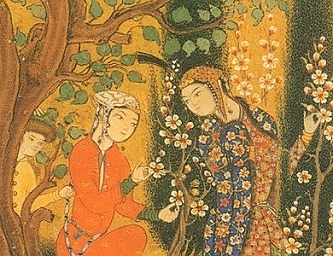SELECTIONS FROM THE POETRY OF THE AFGHĀNS
FROM THE SIXTEENTH TO THE NINETEENTH CENTURY,
LITERALLY TRANSLATED FROM THE ORIGINAL PUS´HTO;
WITH NOTICES OF THE DIFFERENT AUTHORS,
AND REMARKS
ON THE MYSTIC DOCTRINE AND POETRY OF THE ṢŪFĪS:
BY MAJOR H. G. RAVERTY
BOMBAY ARMY, RETIRED LIST;
AUTHOR OF A GRAMMAR, AND DICTIONARY OF THE PUS´HTO OR AFGHAN LANGUAGE; THE GULSHAN-I-ROH, OR SELECTIONS, PROSE AND POETICAL, IN THE PUS´HTO OR AFGHĀN LANGUAGE; THE GOSPEL FOR THE AFGHĀNS; A THESAURUS OF ENGLISH AND HINDŪSTĀNĪ TECHNICAL TERMS,
ETC. ETC.
“Full many a gem of purest ray serene
The dark unfathom’d caves of ocean bear;
Full many a flower is born to blush unseen,
And waste its sweetness on the desert air.”
(New and Cheaper Edition.)
LONDON:
WILLIAMS AND NORGATE,
HENRIETTA STREET, COVENT GARDEN, & SOUTH FREDERICK STREET, EDINBURGH.
CALCUTTA: W. NEWMAN & CO.
MDCCCLXVII.
1869
Scanned, proofed and formatted at sacred-texts.com by John Bruno Hare, November 2007. This text is in the US public domain because it was published prior to 1923.

This is an anthology of English translations of Pushto poets from the 16th century on. Most, if not all, of these poets are Sufi. They utilize the poetic vocabulary of Sufiism: the tavern, the wine, the flowers, etc., all actually technical terms describing the soul’s progression on the mystical path towards God. Raverty’s introductory essay, “Remarks on the Mystic Doctrine and Poetry of the Sufis” provides a skeleton key to the symbology.
Most of the writers included here were, in addition to being Sufi poets, tribal leaders, men of action, in many cases related in some fashion. For instance, the prolific Khushhal Khan fathered Ashraf Khan and Abd-ul-Kadir Khan, all very formidable poets and warriors. Their poetry reflects a tribal, patriarchal society (women don’t normally appear in these texts except as the ‘beloved,’ or a target of scorn). However, this is not the bleak, bigoted, art and music starved world of the Taliban. It is clear that not all of that Sufi joie de vivre is metaphorical, and many of the verses display a wicked sense of humor. The descriptions of nature are realistic, and their love of country is fierce.
Raverty (b. 1825, d. 1906), a Major in the British Army, fought in the Punjab from 1849-50. From 1852-9 he was Assistant Commissioner of the Punjab. His duties involved extensive travel in what is today Pakistan, Afghanistan, and India. He wrote one of the first Pushto grammars in 1855. He also wrote a Pushto-English dictionary, and a volume of Pushto texts in the original language, which served as the basis for these translations. The system of transcription in this book, which is reproduced exactly as in the original with the help of Unicode, is not pretty, but at least is applied consistently. Included here are translations of poems only available in manuscripts which Raverty was able to access, obviously very rare. This book, itself, is fairly rare, and appears for the first time on the Internet at this site.
¶ Index
- To the Reader
- Remarks on the Mystic Doctrine and Poetry of the Ṣūfīs
- Æabd-ur-Raḥmān
- Mīrzā Khān, Anṣārī
- Æabd-ul-Ḥamīd
- Khushḥāl Khān, Khattak
- Ashraf Khān, Khattak
- Æabd-ul-Ḳādir Khān, Khattak
- Aḥmad Shāh, Abdālī, Shāh Durr-i-Durrān
- Kāzim Khān, Khattak, Surnamed Shaidā
- Khwājah Muḥammad, Bangash